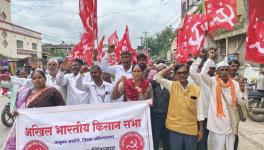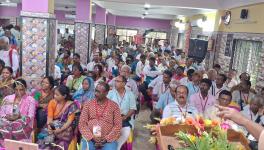Mahapanchayats in Madhya Pradesh
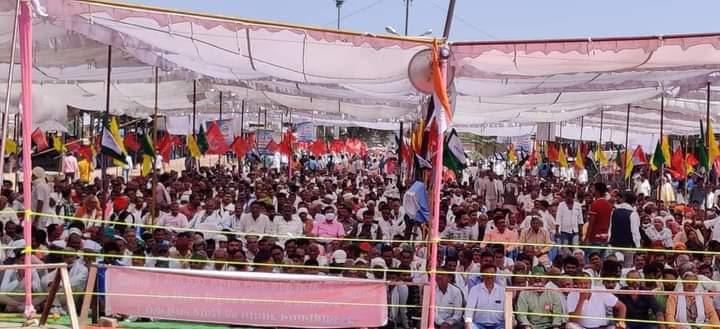
Mahapanchayat in Sehora, Jabalpur on March 15
With massive participation of regional farming communities, farmers’ agitation against farm laws has gained wider support in various North Indian states. In the last two months, scores of massive Kisan Mahapanchayats have been held in Punjab, Haryana, Uttar Pradesh and Rajasthan. Following their lead, farmers from Madhya Pradesh (MP) have also begun to make their presence felt. Since February, close to 40 panchayats have been organised in different regions of MP. The Mahapanchayats held in Sheopur, Rewa and Jabalpur are reported to have discomforted the state government with a participation of more than 15,000 farmers in each.
Joint Secretary of All India Kisan Sabha (AIKS), Badal Saroj, said, “After the events that unfolded in Delhi on January 26, it was decided that we need to take the movement to our respective regions. We decided to begin with the parliamentary constituencies of the Minister of Agriculture and Farmers Welfare, Narendra Singh Tomar – Morena and Gwalior.” Tomar was elected to the sixteenth Lok Sabha in 2014 from Gwalior. In 2019, he changed his constituency to Morena and was re-elected.
Both Morena and Gwalior are a part of the Chambal region where Kisan Panchayats are being organised on a daily basis since February 2020. In district Morena, Kisan Panchayats have been organised in Sabalgarh, Kailaras, Deora and Morena proper. The Panchayat held in Sabalgarh saw participation of more than 5,000 farmers. In district Gwalior, a total of eight panchayats have been organised including in villages Mohana, Kuleth and Tighra.
Chambal is a relatively prosperous region of Madhya Pradesh with better irrigation facilities as compared to other regions which are completely dependent on monsoon rains for irrigation. Located within the parliamentary constituency of Tomar, Sheopur is also a part of Chambal region. The Mahapanchayat of March 8 was held in Sheopur where more than 15,000 farmers poured in to hear speeches of farm leaders Rakesh Tikait from Bharatiya Kisan Union (Tikait) and Amra Ram, Vice President, AIKS.
Explaining the reasons behind the enthusiastic response of the state’s farmers to Panchayats Radheshyam Meena, a farm leader from Sheopur, said that the farmers have now understood that there is nothing for them in these laws. He added, “BJP members are also trying to organise meetings in villages but the resentment and anger of farmers has made it difficult for them to even organise these meetings. Even Narendra Singh Tomar has not visited his constituency since the agitation has started.”
Discussing the repressive measures undertaken to curb farmers’ Panchayats, Meena said that the government has filed multiple cases against farm leaders and five FIRs have been filed against him. “They want to weaken the movement through these measures, but the more they try to repress us, the more the movement will be strengthened,” he added.
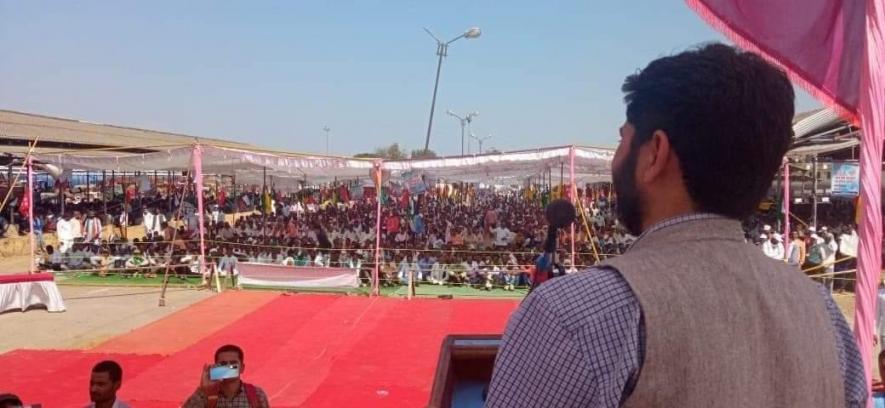
Dr. Vikram Singh addressing Mahapanchayat in Rewa on March 14
Expanding to other regions of MP, Panchayats have been organised in districts Rewa, Satna and Singrauli in Vindhya Pradesh. The most successful Mahapanchayat in the region was held on March 14 in Rewa with attendance of about 15,000 people including small and medium farmers, landless labourers, workers from cement factories in Rewa and Satna and Anganwadi workers. This Mahapanchayat saw significant participation of women. Amongst the senior leadership that addressed the farmers in this gathering included Rakesh Tikait, Amra Ram, Major Singh Punnawal (General Secretary, Punjab Kisan Sabha), and Dr. Vikram Singh (Joint Secretary, All India Agricultural Workers Union). Preparations are on for another Mahapanchayat in Semariya, another village in district Rewa on April 5.
Emphasising the necessity of other sections of society joining this agitation, Girijesh Singh Sengar from AIKS, Rewa said, “It is important to have the working classes join the struggle with the farmers. In light of this, we organised a kisan-majdoor (farmer-worker) panchayat in Dhabhora (Atraila) on March 15 which was attended by a total of 1000 farmers and workers.”
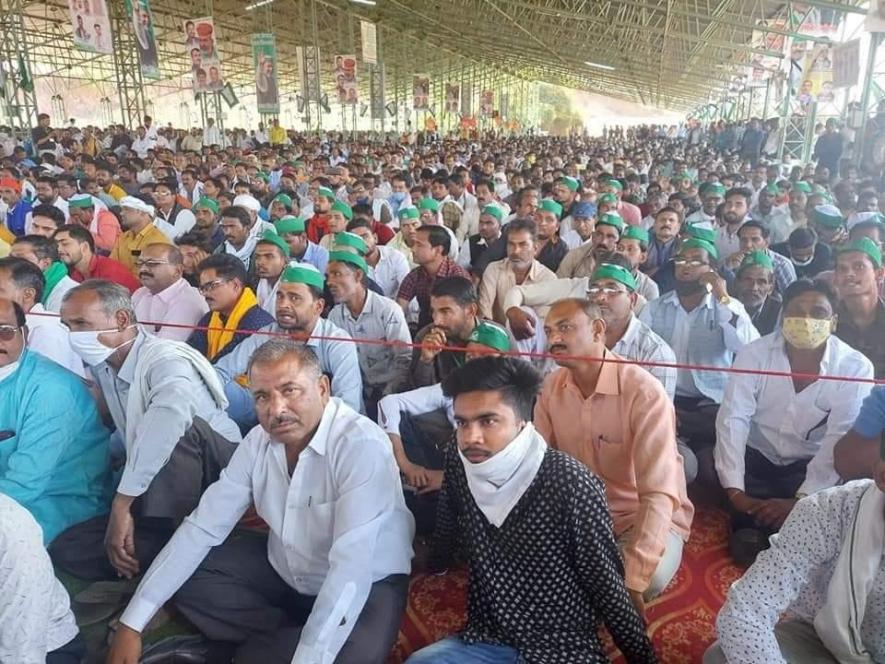
Mahapanchayat at Sehora, Jabalpur on March 15
On March 15, another Mahapanchayat was organised in Sehora in Jabalpur district which was attended by more than 15,000 farmers. Panchayats with an average of 500-1,500 farmers are also taking place in villages in Malwa and Mahakoshal on a daily basis. In Malwa, six major Panchayats have taken place in Shajapur, Sehore, Dhar, Ratlam and Badwani. In the fifth region of Bundelkhand as well, farmers have started mobilising.
Alongside the Panchayats in MP, Kisan mobilisation has also begun in Chhattisgarh. In the last week, three Panchayats have been held in Bastar, Darbha and Raigad with an average turnout of 150 farmers from the Adivasi community. In the coming two weeks, 20 more panchayats have been planned.
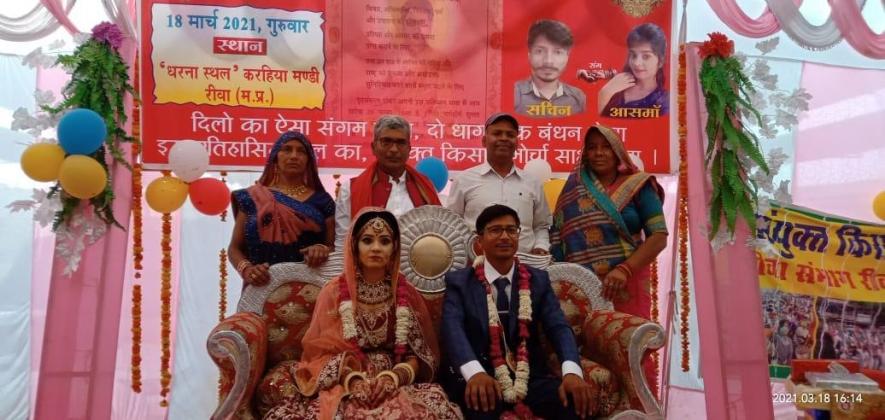
Sachin Bihra and Aasma Singh got married at the dharna site in Rewa, Madhya Pradesh.
The dedication of the farmers and their families towards the movement is such that they have been celebrating all familial occasions on the site of dharnas. On March 18, the commitment of the farmers in Rewa was reflected when Sachin Bihra and Aasma Singh got married on the premises where a dharna has been going on since January 3. The father of the groom is the District General Secretary of AIKS, Rewa and has been involved in the movement since the beginning.
Bihra explained, “It was not possible for our family to withdraw from the movement to make arrangements for our wedding. We have resolved to continue our struggle till the three farm laws are repealed. So, we decided to get married at the dharna site. The bride also comes from a family of farmers and they were supportive of this decision.” The bride and the groom took their oaths swearing on the Constitution of India and the families rejected all forms of ritualism. The expenses incurred in the ceremony were borne by the Kisan Sabha and the Samyukta Kisan Morcha.
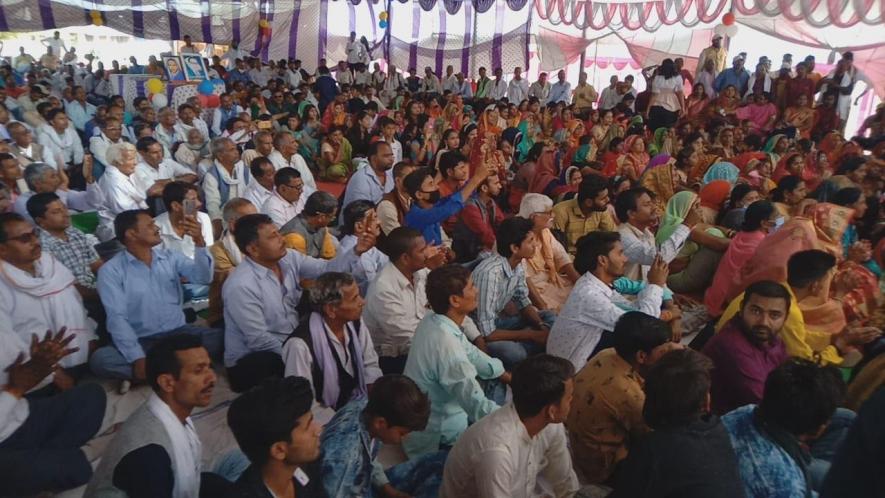
Farmers attend the marriage ceremony amidst the Kisan Andolan in Rewa.
Talking enthusiastically about the intended message of this wedding, AIKS leader Girijesh Singh Sengar asserted, “while we are fighting to protect agriculture and our livelihood, it is also our responsibility to simultaneously fight the regressive traditions in our society.” Bihra added, “Through this initiative, we wanted to send across our message to the government and the society that the movement cannot be stopped and we will fight against the black laws until they are repealed.”
The writer is an author and a research associate with Newsclick. The views are personal. She can be reached on Twitter @ShinzaniJain.
Also read: Withdraw Pattern of Assistance Document, Shutdown Strike to Continue: DUTA
Get the latest reports & analysis with people's perspective on Protests, movements & deep analytical videos, discussions of the current affairs in your Telegram app. Subscribe to NewsClick's Telegram channel & get Real-Time updates on stories, as they get published on our website.












